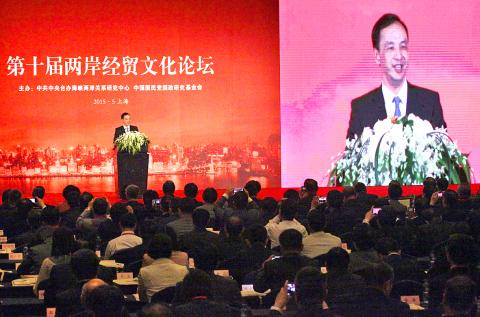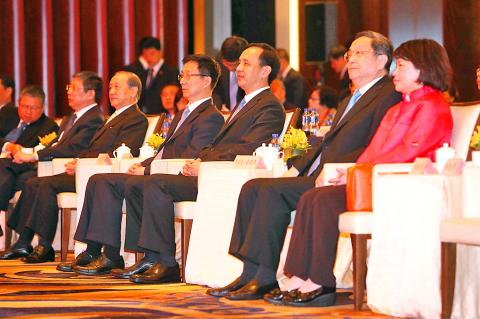New Taipei City Mayor and Chinese Nationalist Party (KMT) Chairman Eric Chu (朱立倫) yesterday expressed hope that Taiwan would develop a greater role in the global community based on the so-called “1992 consensus” between Taiwan and China.
Speaking at the 10th Cross-Strait Economic, Trade and Culture Forum in Shanghai, Chu said that he expects Taiwan to play a bigger role if the nation takes part in the China-initiated Asian Infrastructure Investment Bank (AIIB), Beijing’s “One Belt, One Road” trade initiative and the Regional Comprehensive Economic Partnership (RCEP) trade bloc.
Despite its smaller economy, land mass and population, Taiwan has strengths in innovation, management experience and research and development, allowing it to make substantial contributions to regional economic development through cooperation with China, Chu said.

Photo: AP
The “1992 consensus” refers to a supposed understanding between the KMT and the Chinese Communist Party (CCP) that both Taiwan and China acknowledge there is “one China,” with each side having its own interpretation of what that means. In 2006, former KMT legislator Su Chi (蘇起) admitted that he made up the term “1992 consensus” in 2000, when he was head of the Mainland Affairs Council, before the KMT handed power to the Democratic Progressive Party.
National Committee of the Chinese People’s Political Consultative Conference Chairman Yu Zhengsheng (俞正聲) said that Chu’s ideas could be discussed further at the annual KMT-CCP forum, as part of efforts to seek Taiwan’s participation in the AIIB, the “One Belt, One Road” initiative and the RCEP, and further possible approaches for cross-strait cooperation.
The discussions are aimed at increasing the competitiveness of “ethnic Chinese” and expanding their presence in the international market, Yu said.

Photo: CNA
Yu also said that the annual forum should stick to China’s stance regarding the “1992 consensus” and opposition to Taiwanese independence, which he described as a “mutual political foundation” for the development of cross-strait relations.
As China enters what has been called a “new normal” with lower economic growth, Beijing plans to help drive rational industrial positioning and introduce new measures for Taiwanese companies in China to address their problems with transformation and upgrading, Yu said.
China will also continue to protect the interests of the Taiwanese public, small and medium-size businesses, farmers and fishermen, allowing them to enjoy the benefits of enhanced cross-strait relations, he said.
Yu also urged the expansion of youth exchanges between Taiwan and China to encourage the wider involvement of young people in efforts to improve related policies.
Chu arrived in Shanghai on Saturday with a 100-member delegation to attend the annual KMT-CCP economic and cultural forum.
The highlight of Chu’s three-day visit is expected to be his first meeting with Chinese President and CCP General Secretary Xi Jinping (習近平). The meeting is to take place in Beijing today.
Chu yesterday avoided giving a direct answer to reporters’ questions about a peace pact between Taiwan and China.
Asked whether he would take advice provided by New Party Chairman Yok Mu-ming (郁慕明) and raise the issue of a cross-strait peace accord during a meeting with Xi, Chu said only that there are different opinions in Taiwan regarding the issue.
Some people prefer a more active pursuit of a peace pact and some are against it, but the KMT has its own objective and course of action, he said.
“We will hold our ground on what to do,” Chu said.

ACTION PLAN: Taiwan would expand procurement from the US and encourage more companies to invest in the US to deepen bilateral cooperation, Lai said The government would not impose reciprocal tariffs in retaliation against US levies, President William Lai (賴清德) said yesterday, as he announced five strategies to address the issue, including pledging to increase Taiwanese companies’ investments in the US. Lai has in the past few days met with administrative and national security officials, as well as representatives from various industries, to explore countermeasures after US President Donald Trump on Wednesday last week announced a 32 percent duty on Taiwanese imports. In a video released yesterday evening, Lai said that Taiwan would not retaliate against the US with higher tariffs and Taiwanese companies’ commitments to

‘SPECIAL CHANNEL’: Taipei’s most important tasks are to stabilize industries affected by Trump’s trade tariffs and keep negotiations with Washington open, a source said National Security Council Secretary-General Joseph Wu (吳釗燮) arrived in the US for talks with US President Donald Trump’s administration, a source familiar with the matter said on Friday. Wu was leading a delegation for a meeting known as the “special channel,” the Financial Times reported earlier. It marked Trump’s first use of the channel since returning to the White House on Jan. 20. Citing a source familiar with the matter, the Financial Times reported that Minister of Foreign Affairs Lin Chia-lung (林佳龍) was also a part of the delegation. The visit came days after China concluded war games around Taiwan and amid Trump’s

Intelligence agents have recorded 510,000 instances of “controversial information” being spread online by the Chinese Communist Party (CCP) so far this year, the National Security Bureau (NSB) said in a report yesterday, as it warned of artificial intelligence (AI) being employed to generate destabilizing misinformation. The bureau submitted a written report to the Legislative Yuan in preparation for National Security Bureau Director-General Tsai Ming-yen’s (蔡明彥) appearance before the Foreign Affairs and National Defense Committee today. The CCP has been using cognitive warfare to divide Taiwanese society by commenting on controversial issues such as Taiwan Semiconductor Manufacturing Co’s (TSMC, 台積電) investments in the

HELPING HAND: The steering committee of the National Stabilization Fund is expected to hold a meeting to discuss how and when to utilize the fund to help buffer the sell-off The TAIEX plunged 2,065.87 points, or 9.7 percent, to close at 19,232.35 yesterday, the highest single-day percentage loss on record, as investors braced for US President Donald Trump’s tariffs after an extended holiday weekend. Amid the pessimistic atmosphere, 945 listed companies led by large-cap stocks — including Taiwan Semiconductor Manufacturing Co (TSMC, 台積電), Hon Hai Precision Industry Co (鴻海精密) and Largan Precision Co (大立光) — fell by the daily maximum of 10 percent at the close, Taiwan Stock Exchange data showed. The number of listed companies ending limit-down set a new record, the exchange said. The TAIEX plunged by daily maxiumu in just